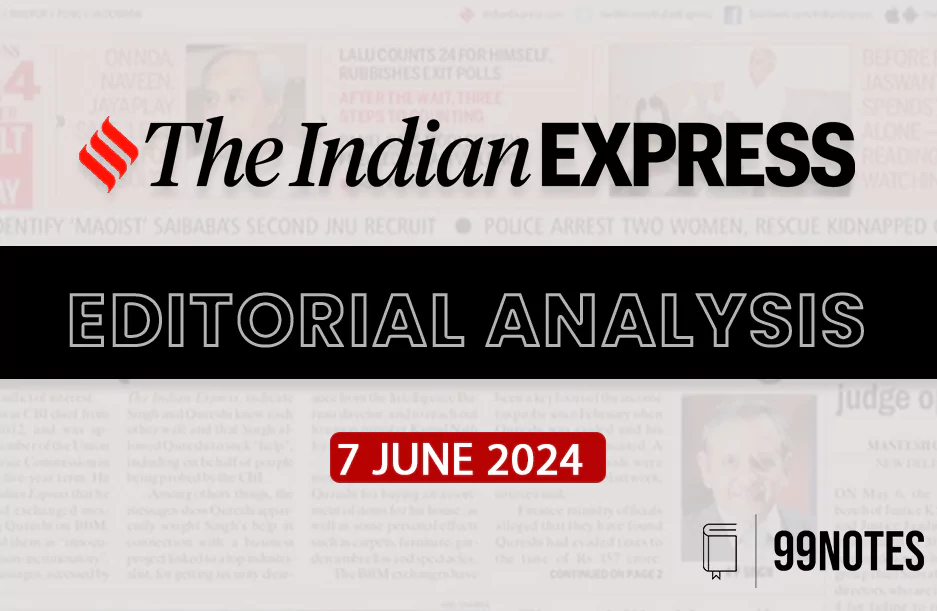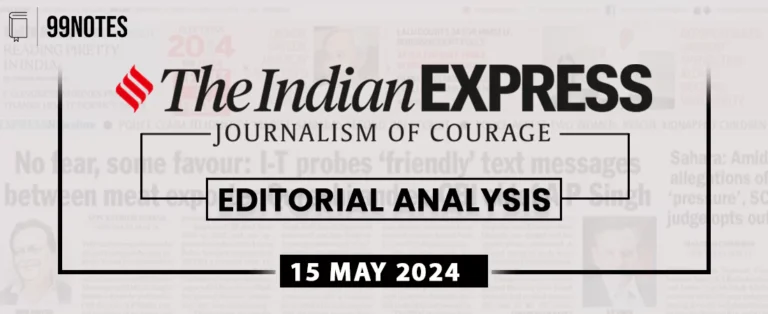7 June 2024 : Indian Express Editorial
1. ROTI DAL SABZI
| Topic: GS2 – Governance – Government policies– Interventions for development in various sectors GS3 – Indian Economy |
| Context: |
|
Inflation’s Decisive Impact:
- In the lead-up to the 2019 election, the average annual consumer price index (CPI) inflation was a manageable 3.3 percent, with retail food inflation almost negligible at 0.03 percent.
- This low inflation environment created favorable conditions for the Narendra Modi government to secure a significant victory. In stark contrast, the 2024 scenario was marked by higher overall CPI inflation, averaging 5.37 percent, and even more pronounced food inflation at 7.88 percent.
- Essential commodities like cereals, pulses, and vegetables saw price hikes of 10.39 percent, 16.07 percent, and 18.33 percent, respectively.
- These substantial increases likely had a considerable impact on the average voter, making inflation a critical issue in the 2024 elections.
Government’s Response to Inflation:
- The Modi government was aware of the inflationary pressures and attempted to address them through various supply-side measures.
- These included allowing imports of major pulses and edible oils at minimal duties, restricting exports of wheat, non-basmati rice, sugar, and onions, and imposing stocking limits on traders and retailers for wheat and pulses.
- However, a combination of factors, such as an El Niño-induced poor monsoon in 2023-24, disruptions due to COVID-19, and the Russia-Ukraine war, sustained inflationary pressures throughout Modi’s second term.
- These persistent economic challenges underscored the difficulties in managing inflation effectively.
Challenges for the Incoming Government:
- As the Modi-led National Democratic Alliance (NDA) government prepares for its third term, controlling inflation will be a top priority. Continued low or zero-duty imports of pulses and edible oils should be extended to other agricultural commodities like wheat.
- The Reserve Bank of India (RBI) also faces constraints in cutting policy interest rates without first stabilizing inflationary expectations, which are closely tied to the prices of staple foods like roti, dal, and sabzi.
- Although the current monsoon season has been promising, ensuring a bountiful kharif harvest is crucial for moderating food inflation. Regardless of the monsoon’s outcome, managing food inflation remains a formidable challenge for the new government.
Conclusion:
- The 2024 election results underline the significant impact of economic issues, particularly inflation, on voter behavior and political outcomes.
- The Modi government’s response to inflation, though proactive, faced substantial external challenges, highlighting the complexity of economic management in a volatile global environment.
- Moving forward, the incoming government must prioritize effective inflation control measures and ensure economic stability to address voter concerns and sustain political legitimacy.
| What has Caused Inflation in India in Recent Years? |
|
| Practice Question: Discuss the impact of economic issues, particularly inflation and unemployment, on the outcome of the 2024 elections in India. How did the government’s response to inflation influence voter sentiment, and what challenges does the incoming government face in addressing these economic concerns? (250 words/15 m) |



